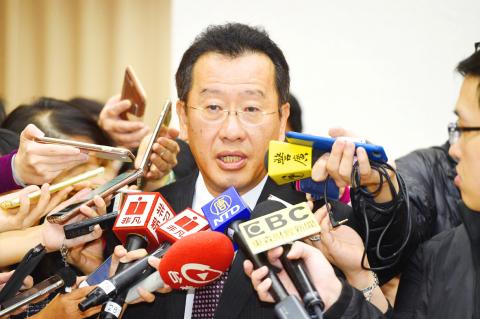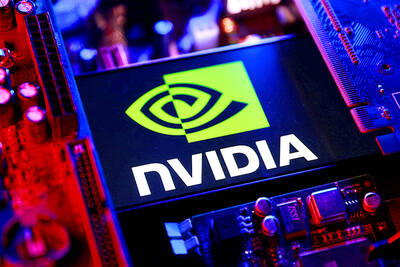Members of the legislature’s Finance Committee yesterday urged banks not to use Huawei Technologies Co Ltd’s (華為) equipment due to national security concerns, after Australia, New Zealand, the UK and Japan moved to restrict the Chinese telecom’s business.
However, Financial Supervisory Commission (FSC) Chairman Wellington Koo (顧立雄) told the committee that the commission needs to look at domestic regulations and WTO agreements to see whether it has the right to restrict banks from using Huawei’s equipment.
Huawei chief financial officer Meng Wanzhou (孟晚舟) was arrested on Dec. 1 in Canada on a US extradition request, after US authorities launched an investigation into alleged breaches of US sanctions on Iran by the Chinese firm.

Photo: George Tsorng, Taipei Times
Several nations have expressed national security concerns about the use of Huawei’s products, which have been dubbed a “Trojan horse,” Democratic Progressive Party (DPP) Legislator Yu Wan-ju (余宛如) said.
The company has provided products to financial institutions to develop digital finance services, Yu said, urging the commission to ban domestic banks from using Huawei’s equipment.
Koo said that most banks in the nation use components made by IBM Corp in their servers, which he called their “core equipment.”
“I do not think Huawei has a high market share in terms of such equipment,” he said.
However, the commission would review the issue soon, Koo said, adding that it does not use any Chinese-made cybersecurity equipment.
Yu said that Taiwanese banks, including Web-only banks that are to be launched next year, should not be allowed to use any software or hardware made in China.
“At least state-owned banks should not use Huawei’s equipment, nor their chairpeople and presidents use Huawei smartphones or the messaging app WeChat (微信),” she said.
DPP Legislator Tsai Yi-yu (蔡易餘) said financial institutions that use Huawei’s products should detail the type of equipment they use.
Koo said he does not use WeChat.
“The FSC and financial institutions know that national security is important, but we have to confirm if such a ban is legal,” Koo said, adding that it is easier to ask state-run banks to ban Huawei’s products, but it would be another story for private banks.
Most Taiwanese banks use IBM products, so it would not be a problem if the commission were to ban the use of Huawei products in the financial sector, a bank manager told the Taipei Times by telephone on condition of anonymity.

POWERING UP: PSUs for AI servers made up about 50% of Delta’s total server PSU revenue during the first three quarters of last year, the company said Power supply and electronic components maker Delta Electronics Inc (台達電) reported record-high revenue of NT$161.61 billion (US$5.11 billion) for last quarter and said it remains positive about this quarter. Last quarter’s figure was up 7.6 percent from the previous quarter and 41.51 percent higher than a year earlier, and largely in line with Yuanta Securities Investment Consulting Co’s (元大投顧) forecast of NT$160 billion. Delta’s annual revenue last year rose 31.76 percent year-on-year to NT$554.89 billion, also a record high for the company. Its strong performance reflected continued demand for high-performance power solutions and advanced liquid-cooling products used in artificial intelligence (AI) data centers,

SIZE MATTERS: TSMC started phasing out 8-inch wafer production last year, while Samsung is more aggressively retiring 8-inch capacity, TrendForce said Chipmakers are expected to raise prices of 8-inch wafers by up to 20 percent this year on concern over supply constraints as major contract chipmakers Taiwan Semiconductor Manufacturing Co (TSMC, 台積電) and Samsung Electronics Co gradually retire less advanced wafer capacity, TrendForce Corp (集邦科技) said yesterday. It is the first significant across-the-board price hike since a global semiconductor correction in 2023, the Taipei-based market researcher said in a report. Global 8-inch wafer capacity slid 0.3 percent year-on-year last year, although 8-inch wafer prices still hovered at relatively stable levels throughout the year, TrendForce said. The downward trend is expected to continue this year,

‘BASICALLY A BAN’: Sources said the wording governing H200 imports from officials was severe, but added that the regulations might change if the situation evolves Chinese customs authorities told customs agents this week that Nvidia Corp’s H200 artificial intelligence (AI) chips are not permitted to enter China, three people briefed on the matter said. Chinese government officials also summoned domestic technology companies to meetings on Tuesday, at which they were explicitly instructed not to purchase the chips unless necessary, two of the people and a third source said. “The wording from the officials is so severe that it is basically a ban for now, though this might change in the future should things evolve,” one of the people said. The H200, Nvidia’s second-most powerful AI chip, is one

A proposed billionaires’ tax in California has ignited a political uproar in Silicon Valley, with tech titans threatening to leave the state while California Governor Gavin Newsom of the Democratic Party maneuvers to defeat a levy that he fears would lead to an exodus of wealth. A technology mecca, California has more billionaires than any other US state — a few hundred, by some estimates. About half its personal income tax revenue, a financial backbone in the nearly US$350 billion budget, comes from the top 1 percent of earners. A large healthcare union is attempting to place a proposal before